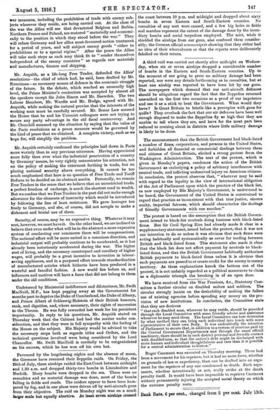Mr. Asquith, as a life-long Free Trader, defended the Allies'
resolutions—the chief of which had, he said, been drafted by Mr. Runciman—as necessary means of defence in the economic struggle of the future. In the debate, which reached an unusually high level, the Prime Minister's contention was accepted by almost all the speakers except Sir John Simon and Mr. Snowden. The two Labour Members, Mr. Wardle and Mr. Hodge, agreed with Mr. Asquith, while making the natural proviso that the interests of the working man must be carefully secured. Mr. Bonar Law assured the Molise that he and his Unionist colleagues were not trying to secure any party advantage in the old fiscal controversy. And Mr. Churchill summed up the situation by saying that the value of the Paris resolutions as a peace measure would be governed by the kind of peace that we obtained. A complete victory, such as we hope for, will simplify the problem.






























 Previous page
Previous page